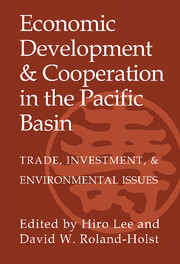 Economic Development and Cooperation in the Pacific Basin
Economic Development and Cooperation in the Pacific Basin Book contents
- Frontmatter
- Contents
- Acknowledgments
- List of Contributors
- I Introduction and Overview
- II U.S.-Japan and Asian Trade Patterns
- III Regional Trading Arrangements in the Pacific Basin
- IV Foreign Direct Investment: Determinants and Consequences
- 7 The Determinants of Foreign Direct Investment: A Survey with Applications to the United States
- 8 Are Trade and Direct Investment Substitutes or Complements? An Empirical Analysis of Japanese Manufacturing Industries
- 9 Korea's Outward Foreign Direct Investment and the Division of Labor in the Asia-Pacific
- 10 China's Absorption of Foreign Direct Investment
- 11 The Impact of Foreign Investment in Indonesia: Historical Trends and Simulation Analysis
- V Trade, Resources, and the Environment
- Index
9 - Korea's Outward Foreign Direct Investment and the Division of Labor in the Asia-Pacific
Published online by Cambridge University Press: 19 May 2010
- Frontmatter
- Contents
- Acknowledgments
- List of Contributors
- I Introduction and Overview
- II U.S.-Japan and Asian Trade Patterns
- III Regional Trading Arrangements in the Pacific Basin
- IV Foreign Direct Investment: Determinants and Consequences
- 7 The Determinants of Foreign Direct Investment: A Survey with Applications to the United States
- 8 Are Trade and Direct Investment Substitutes or Complements? An Empirical Analysis of Japanese Manufacturing Industries
- 9 Korea's Outward Foreign Direct Investment and the Division of Labor in the Asia-Pacific
- 10 China's Absorption of Foreign Direct Investment
- 11 The Impact of Foreign Investment in Indonesia: Historical Trends and Simulation Analysis
- V Trade, Resources, and the Environment
- Index
Summary
INTRODUCTION
Foreign direct investment (FDI) has emerged as an engine of growth for the world economy and has drastically changed the structure of division of labor in both developed and developing countries. Korea is no exception to this general trend. Since the mid-1980s, Korea's outward FDI has surged, and Korea has emerged as a major investor in Asian developing countries. The progress of globalization and industrial restructuring of the Korean economy is likely to result in continued growth of FDI.
FDI is an important channel in reinforcing the process of market-driven integration in global as well as regional economies because it purports to bring mutual benefits to both host and source countries. The host country can gain benefits including employment creation, transfer of technology, and management know-how. For the source country, or multinational corporations, FDI provides an excellent opportunity to maximize firm-specific advantages by lowering production costs and gaining improved access to new markets.
FDI does not always result in positive economic effects, however, as there are mixed views on the effects of Korea's outward FDI. On the one hand, outward FDI is perceived to contribute to the promotion of industrial restructuring and exports through trade between parent firms and their affiliates. On the other hand, it is presumed to replace domestic investment and exports, thereby accelerating “deindustrialization.” The proponents of the latter view argue that outward FDI should be closely regulated to minimize the negative impact on the domestic economy.
- Type
- Chapter
- Information
- Economic Development and Cooperation in the Pacific BasinTrade, Investment, and Environmental Issues, pp. 297 - 330Publisher: Cambridge University PressPrint publication year: 1998


